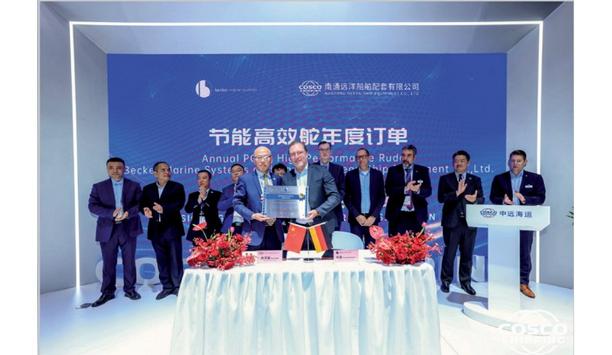ABB has secured a contract with Auckland Transport (AT) to deliver the maritime world’s first megawatt charging system (MCS) to recharge electric ferries using the same interface as trucks and aeroplanes. Lowering the barrier to entry, the standardised and highly adaptable system is expected to improve electric vessel competitiveness against fossil-fueled counterparts.
As part of its Mission Electric initiative, AT has ordered two 200-seat all-electric ferries and two 300-passenger hybrid-electric ferries and is expected to become the largest electric ferry fleet operator in the Southern Hemisphere by 2030.
New Auckland-owned ferries
The new ferries are estimated to help AT cut diesel use by 1.5 million litres, and CO2e emissions
Replacing conventional, diesel-operated ferries, the new ferries are estimated to help AT cut diesel use by 1.5 million litres, and CO2e emissions by 4,000 metric tonnes per year, equivalent to the annual emissions generated by about 90 diesel buses.
“It is incredibly exciting to lead the way with modern, low-emission public transport,” said Nathan Cammock, Programme Director, Auckland Transport. “Our new Auckland-owned ferries will bring greater passenger capacity, improved accessibility and a more consistent customer experience. They will rely on modern charging infrastructure to deliver on these capabilities.”
2050 Net-zero emissions target
While ferries carry only six percent of public transport users in Auckland, their diesel engines produce 20 percent of the city’s public transport greenhouse gas emissions. New Zealand has set decarbonisation goals by including a 2050 net-zero emissions target in its Zero Carbon Act. Given its responsibility for public transport infrastructure around the Hauraki Gulf, AT has chosen to electrify its ferry network using the CharIN megawatt charging system standard.
ABB will work with local partners to deliver, engineer and install five complete charging solutions during 2024 and 2025 at several ferry terminals. Each system will feature a pair of 1.65MW chargers, consisting of a transformer, ACS880 converters, MCS plugs and cable management on the ferry pontoons.
ABB lower-power charging solution
Chargers will deliver over three megawatts of direct current power to sustain the short turnarounds
The chargers will deliver over three megawatts of direct current (DC) power to sustain the short turnarounds and high-power demands needed to maintain an efficiently operated ferry fleet. The connectors will be handled by the crew during passenger turnarounds.
The Auckland installation will also be the first MCS supplied by ABB to benefit from the standardised plug-in interface, although the group has been delivering shore-to-ship power for over 20 years since an initial contract with Princess Cruises in Alaska. The Auckland solution will be similar in charging capacity to ABB’s landmark project to support 10 all-electric ferries for public transportation provider Transtejo Soflusa in Lisbon, Portugal. New Zealand’s first fully electric, high-speed passenger ferry Ika Rere in Wellington utilises an ABB lower-power charging solution for electric vehicles.
ABB’s global support capabilities
“ABB’s proven experience in delivering robust and high-performance ship charging solutions and their willingness to embrace the megawatt charging system were major considerations in AT’s choice,” commented Murray Burt, Chief Engineer, Auckland Transport.
“It was important to combine ABB’s global support capabilities and long-standing local presence for a project that will transform Auckland’s ferry services.”
Noise- and emission-free operations
Electrification is crucial and we must move away from emissions-generating technologies
“Ferries connect communities and have a significant impact on the environment,” said Palemia Field, Ferry Segment Manager, ABB Marine & Ports.
“There’s a well-known Māori proverb which says ‘ka pū te ruha, ka hao te rangatahi’, or ‘once the old fishing net is worn, it is put aside to make way for the new fishing net’. Electrification is crucial and we must move away from emissions-generating technologies. Noise- and emission-free operations benefit both the broader and local communities, while passengers onboard enjoy improved travel comfort thanks to less vibration.”
Maritime battery capacity
As the electrification of the global ferry fleet increases, ABB expects more operators to opt for a standardised interface that is familiar from other industries. “We are ready to deliver the MCS solution to meet the demand, wherever standardised connections make it easier for operators to design their ferries and terminals,” Field said.
Electric ferry orders made up 37 percent of the maritime battery capacity deliveries between 2019 and 2022, according to research published by IDTechEx. A 2023 forecast from Spherical Insights suggests that the market for all types of electric ships will double in value by 2030 over a 2021 baseline, to surpass $10.5 billion.











